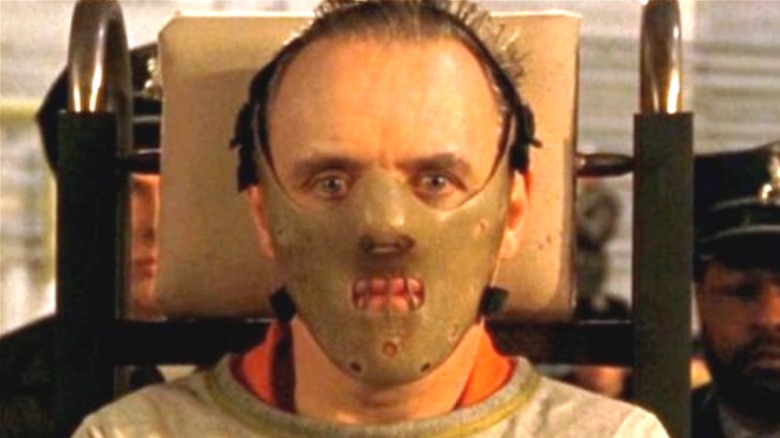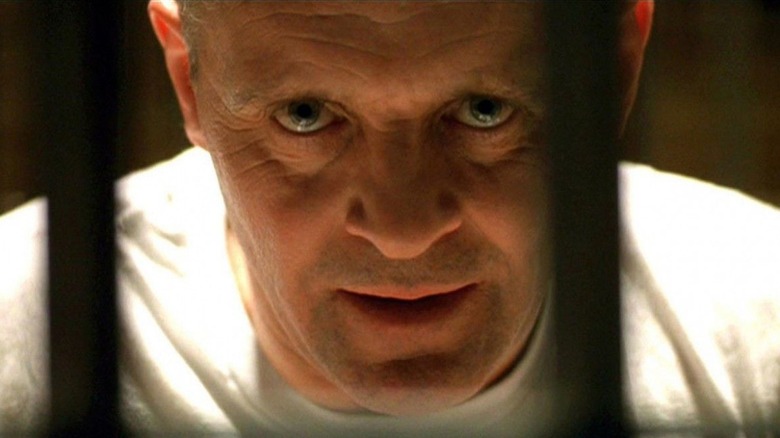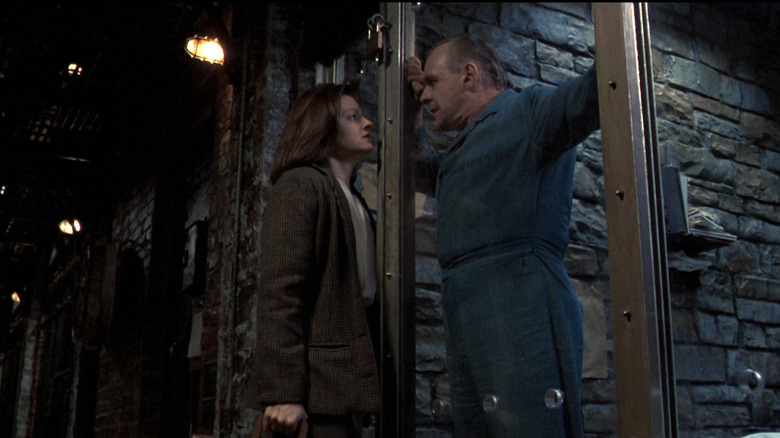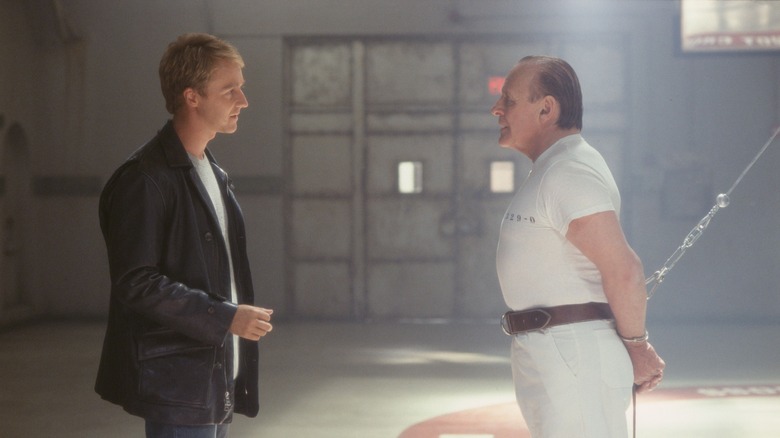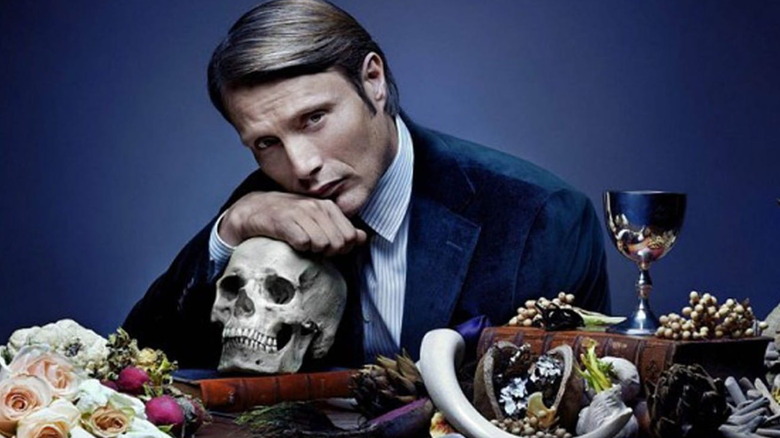How Hannibal Lecter Was Even More Evil Than You Think
You'll never think of fava beans and Chianti the same way again after watching Jonathan Demme's 1991 thriller classic "The Silence of the Lambs." The film was based on the 1988 novel by Thomas Harris and features Anthony Hopkins' iconic (and bone-chilling) take on the fictional forensic psychiatrist Dr. Hannibal "The Cannibal" Lecter, a figure that has disturbed and intrigued audiences for three decades. Dr. Lecter was first introduced in Thomas Harris' 1981 novel "Red Dragon" which was adapted into a 2002 film, one that is closely tied to "The Silence of the Lambs." The film stars Anthony Hopkins, reprising his role as Lecter, and Edward Norton as Will Graham, a retired FBI agent who is tasked to track down the gruesome "Tooth Fairy Killer" (played by Ralph Fiennes) with Lecter's aid.
Another adaptation of "Red Dragon" includes Michael Mann's 1986 film "Manhunter" in which the character of Lecter (Brian Cox) makes his first silver-screen appearance. Other films about Lecter include "Hannibal" and "Hannibal Rising."
How did the infamously beloved monster Hannibal Lecter, one of literature's most reviled, complex, and fascinating cannibalistic serial killers, become so evil? Not every villain is born devious. Lecter, although born to wonderful parents and experienced a privileged upbringing, had a more than unfortunate and disturbing event happen to him when he was a young boy which would turn him into the dementedly charming and suave mastermind that haunts our psyches.
Hannibal Lecter is the most unique villain to ever exist
Lecter's tragic backstory is what causes his frantic descent into cannibalism and murder. As discussed in Harris' novel "Hannibal Rising" and its 2007 film adaptation, Lecter always felt disconnected from people except for his sister, who he loved dearly. A tragedy involving his sister twisted his mind and encouraged his killer tendencies.
When he was young, his parents were brutally killed in front of him by a group of Nazis, and Lecter was forced to eat a stew with remaining bits of his sister, Mischa, mixed into it. Since Mischa was one of the few people that Lecter cared for, he enacted revenge on the killers and eats them. Lecter's evil isn't solely based on the bloody crimes that he commits; it's the warped and egocentric way that he manipulates others for his benefit. He is cunningly intelligent, possesses knowledge on a vast array of subjects, and his dead, piercing blue eyes subtly scream: "I know you better than you know yourself." If that doesn't make you shiver, then we don't know what will.
As one of the most well-developed and engrossing fictional figures to have ever been put to paper and the big-screen, Hannibal Lecter will never leave your mind. And that's just the way he likes it.
"Well, Clarice - have the lambs stopped screaming?"
Dr. Hannibal Lecter is most well-known for appearing in the cult '90s hit "The Silence of the Lambs," alongside Jodie Foster as the headstrong and intelligent FBI trainee Clarice Starling. The movie takes place while Lecter is already locked up in a mental institution for committing his cannibalistic crimes. Starling works with Lecter to gain insight on how to catch a deranged serial killer named Buffalo Bill. Lecter is clearly a cunning sociopath, yet his creepily vulnerable nature is what draws Starling in, seeing him as a human and not just a vile murderer.
One way that Lecter reveals his evil is through his manipulation of Starling. He displays his staunch dominance because he knows he can get away with it, including making sexual comments about Starling. Everything he does and says serves his ego-tripping, but Starling is too clever to buy into his power trip (yet, she does anyway to get what she wants). In an NPR interview with Jodie Foster, she gleans that Lecter is more than just the average villain because of the humanity that he demonstrates to Starling. They create an unspoken bond of trust, since Lecter knows that Starling isn't like all of the others. Internally, Lecter is a wounded lamb, but externally, he appears in the guise of wolf's clothing.
Another twisted way that old-man Lecter traps Starling (and his victims) in his web is by showing off his high-brow genius. Lecter is a superior villain in that he can douse others with his vast knowledge of the arts, culture, and mmm...fine dining. Not only does Lecter highly enjoy eviscerating people, but he also revels in the art of torturing people who are intellectually inferior.
Red Dragon reveals a lot more about Lecter's past
Director Brett Ratner's haunting and stylish crime drama prequel "Red Dragon" was nowhere near as successful as "The Silence of the Lambs," but it remains to be a chilling and unforgettable psychological deep-dive into Hannibal Lecter's journey from man to monster. The film follows Harris' novel more closely in terms of the characterization of the serial killer Francis Dolarhyde (the "Tooth Fairy Killer"), yet treats Lecter as the main focus of the story rather than just a secondary character, as he was presented in Harris' novel and in Mann's "Manhunter."
Lecter's eerie penchant for robotically controlling his body and mannerisms makes him an ideal living, breathing vessel for embodying evil. How can somebody so cold and calculating evoke such warmth? That's what makes Lecter, due to Hopkins' stellar performance, one of the most fascinating (and deadly) serial killers ever brought to life. He loops the audience into his world and it's almost as if they don't want to come out of it, despite the fact that he is an insane killer who enjoys feasting on human flesh. Lecter has a strange ability for making viewers feel sympathetic towards him even though he is unimaginably cruel.
In a scene early on in "Red Dragon," Agent Graham visits Lecter in the Boston State Forensic Hospital. While there, he has a conversation with the hospital's arrogant head director Dr. Frederick Chilton (Anthony Heald) who reveals to Graham that Lecter is "impenetrable to psychological testing." Lecter is too brilliant to let anybody get into his head and, just as he subjects Clarice Starling to his spot-on insights about her, so does he with Graham.
A master of medicine...and so much more
Aside from harboring an above-genius IQ and mastering the art of manipulation, Hannibal Lecter also studied to become a doctor and eventually went on to practice psychiatry. His profound fascination with human anatomy aids in his delectable pleasure of consuming body parts and essential organs. Lecter mischievously wielded his power on his weaker patients to commit heinous crimes just for the fun of seeing what would happen. In the NBC television show, Hannibal, Mads Mikkelsen excellently portrays Dr. Hannibal Lecter, using his intellect and immense knowledge of medicine as a tool for evil, rather than being used for good.
Latin Times explained that the inspiration for the character of Lecter is loosely based on the real-life serial killer Alfredo Ballí Treviño (aka Dr. Salazar), a Mexican doctor who gruesomely dismembered his lover in the 1960s. Novelist Thomas Harris took his own experience from meeting Treviño and incorporated some of the doctor's physical and psychological traits into the mold of the infamous cannibalistic serial killer that would become Hannibal Lecter. Harris understood that even the most despicable people aren't all bad and humans are incomprehensibly complicated by nature.
